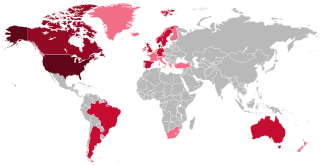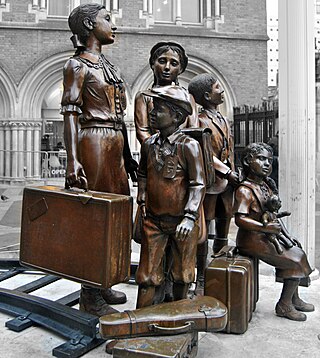Differentiation may refer to:
An ethnicity or ethnic group is a grouping of people who identify with each other on the basis of perceived shared attributes that distinguish them from other groups. Those attributes can include a common nation of origin, or common sets of ancestry, traditions, language, history, society, religion, or social treatment. The term ethnicity is often used interchangeably with the term nation, particularly in cases of ethnic nationalism.
Symbolism or symbolist may refer to:
Identity politics is politics based on a particular identity, such as race, nationality, religion, gender, sexual orientation, social background, caste, and social class. The term could also encompass other social phenomena which are not commonly understood as exemplifying identity politics, such as governmental migration policy that regulates mobility based on identities, or far-right nationalist agendas of exclusion of national or ethnic others. For this reason, Kurzwelly, Pérez and Spiegel, who discuss several possible definitions of the term, argue that it is an analytically imprecise concept.

Danes are an ethnic group and nationality native to Denmark and a modern nation identified with the country of Denmark. This connection may be ancestral, legal, historical, or cultural.
The term "minority group" has different usages, depending on the context. According to its common usage, the term minority group can simply be understood in terms of demographic sizes within a population: i.e. a group in society with the least number of individuals, or less than half, is a "minority". Usually a minority group is disempowered relative to the majority, and that characteristic lends itself to different applications of the term minority.

The United Kingdom is an ethnically diverse society. The largest ethnic group in the United Kingdom is White British, followed by Asian British. Ethnicity in the United Kingdom is formally recorded at the national level through a census. The 2011 United Kingdom census recorded a reduced share of White British people in the United Kingdom from the previous 2001 United Kingdom census. Factors that are contributing to the growth of minority populations are varied in nature, including differing birth rates and Immigration.
Ethnogenesis is the formation and development of an ethnic group. This can originate by group self-identification or by outside identification.
Mixed is the past tense of mix.
Multiplicity may refer to:

The sociology of immigration involves the sociological analysis of immigration, particularly with respect to race and ethnicity, social structure, and political policy. Important concepts include assimilation, enculturation, marginalization, multiculturalism, postcolonialism, transnationalism and social cohesion.
A country is a geopolitical area–often synonymous with a sovereign state.

Since 1922, the United Kingdom has been made up of four countries: England, Scotland, Wales and Northern Ireland. The UK Prime Minister's website has used the phrase "countries within a country" to describe the United Kingdom. Some statistical summaries, such as those for the twelve NUTS 1 regions of the UK, refer to Northern Ireland, Scotland, and Wales as "regions". With regard to Northern Ireland, Scotland and Wales particularly, the descriptive name one uses "can be controversial, with the choice often revealing one's political preferences".
The English people are an ethnic group and nation native to England, who speak the English language, a West Germanic language, and share a common ancestry, history, and culture. The English identity began with the Anglo-Saxons, when they were known as the Angelcynn, meaning race or tribe of the Angles. Their ethnonym is derived from the Angles, one of the Germanic peoples who migrated to Britain around the 5th century AD.

White Irish is an ethnicity classification used in the 2011 United Kingdom Census. In the 2011 census, the White Irish population was 585,177 or 1% of Great Britain's total population.
Dissociation, in the wide sense of the word, is an act of disuniting or separating a complex object into parts.

In sociology, symbolic ethnicity is a nostalgic allegiance to, love for, and pride in a cultural tradition that can be felt and lived without having to be incorporated to the person's everyday behavior; as such, a symbolic ethnic identity usually is composed of images from mass communications media.

Malaysians are citizens who are identified with the country of Malaysia. Although citizens make up the majority of Malaysians, non-citizen residents and overseas Malaysians may also claim a Malaysian identity.






